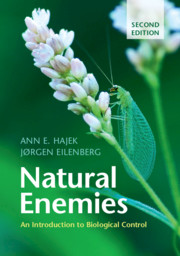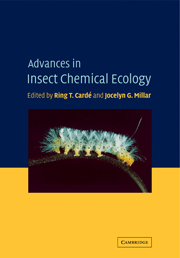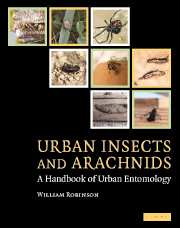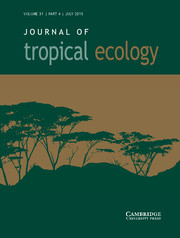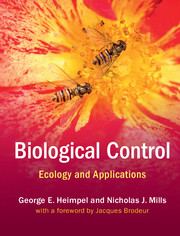
Biological Control
Ecology and Applications
- Authors:
- George E. Heimpel, University of Minnesota
- Nicholas J. Mills, University of California, Berkeley
- Date Published: April 2017
- availability: Available
- format: Hardback
- isbn: 9780521845144
Hardback
Other available formats:
eBook
Looking for an inspection copy?
Please email [email protected] to enquire about an inspection copy of this book
-
Biological control is the suppression of populations of pests and weeds by living organisms. These organisms can provide important protection from invasive species and protect our environment by reducing the need for pesticides. However, they also pose possible environmental risks, so biological control interventions must be undertaken with great care. This book enhances our understanding of biological control interactions by combining theory and practical application. Using a combination of historical analyses, theoretical models and case studies, with explicit links to invasion biology, the authors cover biological control of insects, weeds, plant pathogens and vertebrate animals. The book reflects increasing recognition of risks over the past 20 years, and incorporates the latest technological advances and theoretical developments. It is ideal for researchers and students of biological control and invasion biology.
Read more- Provides a balanced, objective approach, highlighting both the benefits and risks of biological control methods
- Integrates the field of biological control with the latest research in invasion biology
- Includes comprehensive coverage of ecological theory as it relates to biological control, with minimal use of complex mathematical equations
Reviews & endorsements
'Biological control is placed very skilfully within the context of the ecological principles of biological invasions. The authors argue that we have now reached a point where the balance between risks and benefits of biological control is well accepted rather than contested, bringing with it new concepts and approaches to environmental risk assessment. New tools to enhance biological control success and how this can be measured; the emerging focus on conservation and natural biological control; and the growing interest in wider applications of biological control are very lucidly described. This is an inspiring book, with clearly articulated concepts, generous use of case studies and figures to illustrate arguments, and it is extensively referenced. It will prove to be an invaluable text for current and future researchers.' Barbara Barratt, AgResearch, New Zealand
See more reviews'As ecologists and practicing biological control specialists, Heimpel and Mills bring a unique perspective to the study and practice of biological control … their analysis of the principles and practices of modern biological control is deeply rooted in fundamental invasion biology, population dynamics, and evolutionary ecology. Drawing examples and theory from ecological studies, they analyze past and current biological control practices, highlight where they conform or deviate from ecological theory, and shed light on how practices may be improved … Aimed at advanced undergraduates, graduate students, and researchers the text is replete with examples that illuminate the rich history of biological control and its future applications. Given the multifaceted concepts that emerge from each chapter, the text would particularly lend itself to a discussion oriented - flipped classroom - approach.' Douglas A. Landis, Michigan State University
'This book covers biological control from a conceptual viewpoint as well as emphasizing how this pest control approach is now used in an environmentally safe way. The two authors of this excellent book are both highly regarded teachers and researchers in the field of biological control. The authors describe and provide examples of major biological control strategies with advanced coverage of the theoretical ecological underpinnings. Over the past several decades, the field of biological control has undergone a lot of criticism, in particular due to past releases of agents that were not host specific, and this book describes the important changes in the field so that today it is considered a green, as well as effective, pest control approach.' Ann Elizabeth Hajek, Cornell University, New York
'…a volume of remarkable breadth that, in addition to serving as the new standard textbook on biological control, will be of unusual interest to invasion biologists.' Daniel Simberloff, Biol Invasions
'It is an oftentimes cerebral and always well-referenced discussion of scientific issues facing biological control, and their implications for its practice. … The volume is an advanced tour de force by two leaders in the field …' Donald C. Weber, The Quarterly Review of Biology
Customer reviews
Not yet reviewed
Be the first to review
Review was not posted due to profanity
×Product details
- Date Published: April 2017
- format: Hardback
- isbn: 9780521845144
- length: 386 pages
- dimensions: 254 x 195 x 20 mm
- weight: 0.99kg
- contains: 117 b/w illus. 17 tables
- availability: Available
Table of Contents
Foreword Jacques Brodeur
Preface
1. Definitions and interactions
2. Biological control and invasion biology
3. Importation biological control – the scope of success
4. Negative consequences of biological control
5. Ecological risk analysis in biological control
6. Population dynamics in biological control
7. Biological control and evolution
8. Augmentation: orchestrating local invasions
9. Conservation biological control I: orchestrating natural control through habitat manipulation
10. Conservation biological control II: orchestrating natural control through pesticide reduction or selection.
Sorry, this resource is locked
Please register or sign in to request access. If you are having problems accessing these resources please email [email protected]
Register Sign in» Proceed
You are now leaving the Cambridge University Press website. Your eBook purchase and download will be completed by our partner www.ebooks.com. Please see the permission section of the www.ebooks.com catalogue page for details of the print & copy limits on our eBooks.
Continue ×Are you sure you want to delete your account?
This cannot be undone.
Thank you for your feedback which will help us improve our service.
If you requested a response, we will make sure to get back to you shortly.
×
